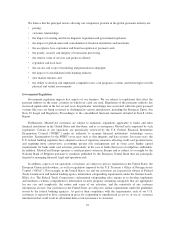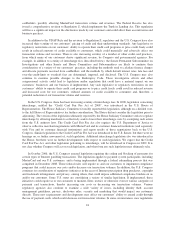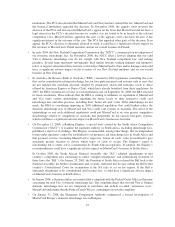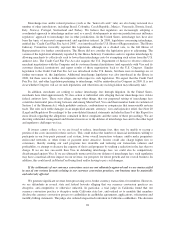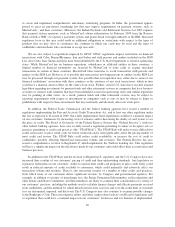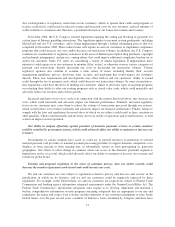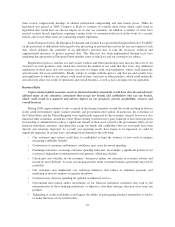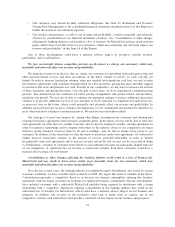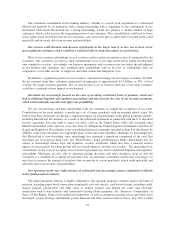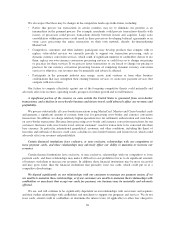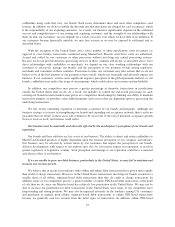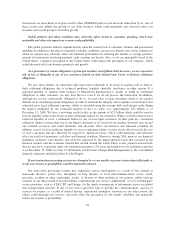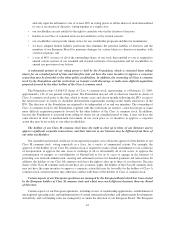MasterCard 2008 Annual Report Download - page 42
Download and view the complete annual report
Please find page 42 of the 2008 MasterCard annual report below. You can navigate through the pages in the report by either clicking on the pages listed below, or by using the keyword search tool below to find specific information within the annual report.been several congressional hearings to address information safeguarding and data breach issues. While no
legislation was passed in 2008, Congress is likely to continue to consider these issues which could result in
legislation that would have an adverse impact on us and our customers. In addition, a number of states have
enacted security breach legislation, requiring varying levels of consumer notification in the event of a security
breach, and several other states are considering similar legislation.
In the European Union, the European Parliament and Council have passed the European Directive 95/46/EC
on the protection of individuals with regard to the processing of personal data and on the free movement of such
data, which obligates the controller of an individual’s personal data to take the necessary technical and
organizational measures to protect personal data. This Directive has been implemented through local laws
regulating data protection in European Union member states to which we and our customers are subject.
Regulation of privacy and data use and security in these and other jurisdictions may increase the costs of our
customers to issue payment cards, which may decrease the number of our cards that they issue. Any additional
regulations in these areas may also increase our costs to comply with such regulations, which could materially
and adversely affect our profitability. Finally, failure to comply with the privacy and data use and security laws
and regulations to which we are subject could result in fines, sanctions or other penalties, which could materially
and adversely affect our results of operations and overall business, as well as have an impact on our reputation.
Business Risks
Unprecedented global economic events in financial markets around the world have directly and adversely
affected many of our customers, merchants that accept our brands and cardholders who use our brands,
which could result in a material and adverse impact on our prospects, growth, profitability, revenue and
overall business.
During 2008, unprecedented events occurred in the financial markets around the world resulting in distress
in the credit environment, equity market volatility and government intervention. In particular, the economies of
the United States and the United Kingdom were significantly impacted by this economic turmoil, however it also
impacted other economies around the world. Some existing customers have gone bankrupt or have been placed in
receivership or administration or have a significant amount of their stock owned by the government. Many of our
financial institution customers, merchants that accept our brands and cardholders who use our brands have been
directly and adversely impacted. As a result, our operating results have begun to be impacted, or could be
negatively impacted, in several ways, including but not limited to the following:
• Our customers may restrict credit lines to cardholders or limit the issuance of new cards to mitigate
increasing cardholder defaults.
• Constriction of consumer and business confidence may cause decreased spending.
• Declining economies can change consumer spending behaviors; for example, a significant portion of our
revenues is dependent on international travel patterns, which may decline.
• Uncertainty and volatility in our customers’ businesses makes our estimates of revenues, rebates and
incentives more difficult. As such, certain prepayments under customer business agreements may not be
realizable.
• Our customers may implement cost reduction initiatives that reduce or eliminate payment card
marketing or increase requests for greater incentives.
• Customers may decrease spending for optional or enhanced services.
• Government intervention and/or investments in our financial institution customers may lead to the
nationalization of those banking institutions or otherwise alter their strategic direction away from our
products.
• Tightening of credit availability could impact the ability of participating financial institutions to lend to
us under the terms of our credit facility.
32


